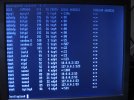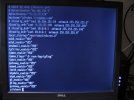After changing our old freebsd web server's static IP today, no one's able to browse to our website--either via the server's IP or our domain name. Firefox returns:
<IP or domain> refused to connect (ERR_CONNECTION_REFUSED)
I AM able to ping the server (and I'm able to ping yahoo, google or our domain from the server), so I'm guessing there's another conf file on the server containing our old IP that needs to be updated, but I've no idea what/where that is? Port 80 appears to be blocked at the server:
--- reading URL <new IP address>
--- contacting host [<new IP address>] on port 80
--- error: connection was rejected
Details...
1) I modified the following two lines in /etc/rc.conf:
ifconfig_vr0=”inet <new IP> netmask <new netmask>″
defaultrouter=”<new router IP>″
Then...
# /etc/rc.d/netif restart && /etc/rc.d/routing restart
2) After updating A Records for our domain's new static IP, an IP Lookup of our domain name returns the new IP, and a DNS Lookup of our domain name returns the correct new IP. So I know the updated A Records have begun to propagate.
3) Email is working. I can send/receive without issues.
I also rebooted the server just to be sure, but, otherwise, that's it.
Can someone tell me what I'm missing?
Many thanks in advance.
<IP or domain> refused to connect (ERR_CONNECTION_REFUSED)
I AM able to ping the server (and I'm able to ping yahoo, google or our domain from the server), so I'm guessing there's another conf file on the server containing our old IP that needs to be updated, but I've no idea what/where that is? Port 80 appears to be blocked at the server:
--- reading URL <new IP address>
--- contacting host [<new IP address>] on port 80
--- error: connection was rejected
Details...
1) I modified the following two lines in /etc/rc.conf:
ifconfig_vr0=”inet <new IP> netmask <new netmask>″
defaultrouter=”<new router IP>″
Then...
# /etc/rc.d/netif restart && /etc/rc.d/routing restart
2) After updating A Records for our domain's new static IP, an IP Lookup of our domain name returns the new IP, and a DNS Lookup of our domain name returns the correct new IP. So I know the updated A Records have begun to propagate.
3) Email is working. I can send/receive without issues.
I also rebooted the server just to be sure, but, otherwise, that's it.
Can someone tell me what I'm missing?
Many thanks in advance.





